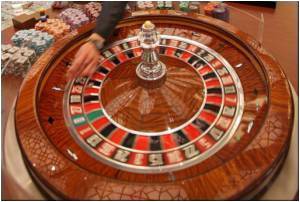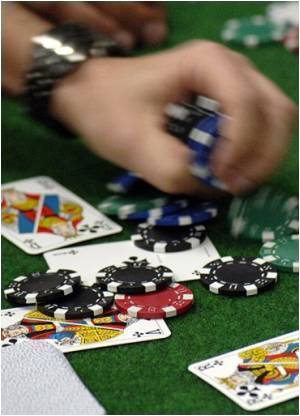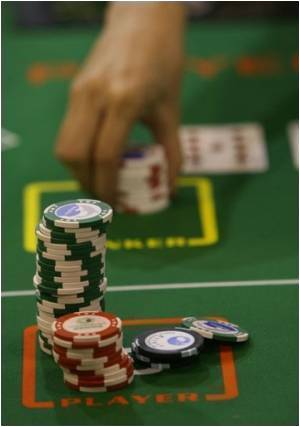Thousands of Macau's youth pass through the mock casino run by the Macau Polytechnic Institute each year, training to work in the various gambling venues.

This is where they come to learn how to deal smoothly, calculate chips in a split second, and deal with the bad losers; to pass exams in baccarat, blackjack and Texas hold-'em.
"We used to earn bad salaries -- now we earn more, and are no longer afraid of finding ourselves without a job," says student Derek Kwok, 30, who is re-training as a dealer after working in hotels for 10 years.
He has witnessed the gaming sector's extraordinary growth since licensing was opened up to foreign competition in the early 2000s, and wants to be part of that boom. Last year the sector grew by 57 percent.
Kwok is one of over 6,600 students taking vocational courses in gaming at the polytechnic this year, another sign of the speed of expansion in an industry that currently employs about 43,000, or 13.5 percent of the workforce, and indirectly provides work to many more.
The mock casino is laid out as an entire gaming floor, complete with cash office and multicoloured carpet, and students take turns to play the parts of gamblers and staff.
Advertisement
Most of the courses are brief, and the salaries on graduation good: dealers start on over 10,000 patacas (US $1,280) per month, said trainer Lucy Ki. Unemployment for June to August this year in Macau was just 2.6 percent.
Advertisement
Yoki Leung, 28, is studying on the degree course and works as a dealer, but her real interests are more sedate. She hates working shifts in a 24-hour casino, and would prefer to work in government while studying cooking and flower arranging on the side.
Leung says she wishes gaming licences had not been opened up.
"Everyone was happy in the past, when earning a monthly salary of 10,000 patacas was plenty. Now everyone agrees that the gambling jobs are the best in the city, and yet even with them, you can't afford a flat," she said.
Her fellow students also cite inflation, social problems and the burden of working nights. The courses include advice on gambling addiction, to which dealers as well as punters can succumb.
And others speak of the strange effect of seeing huge amounts of money won and lost every day.
Mandi Ieong, a degree student aged 20, works as a host on high-roller junket trips that bring in VIP gamblers from Thailand, Japan and South Korea. She has become adept at dealing with demands from gamers to borrow more money once their millions run out.
"I have seen them win 10 million (patacas) and I have seen them lose 10 million, so I am not excited and I am not disappointed when I watch," she said.
Ieong is not interested in gambling herself. "All of my friends, we have realised that if you gamble for a long time, you will lose everything. All my classmates, we are studying this, we know that there's actually nothing to win," she said.
But grateful for the prosperity that gaming has brought, Ieong brushes aside her family's concerns over the antisocial hours and her own scepticism about gambling. "I'm young, I'm still just trying things out," she said.
Professor Zeng Zhonglu, who researches the economics of gambling at the institute, says workers in the industry can afford to be carefree for the next five to six years, as the eye-popping growth is set to continue.
But then it will slow as the sector matures, he predicts, based on surveys of the gamblers who visit Macau. Meanwhile locals will continue to battle inflation and threats to their living standards.
Questions remain over the future of those now entering the industry as dealers, who some casinos will reject later as too old for the quick calculations the role requires.
Meanwhile, Zeng said, young people are becoming complacent, with many failing to carry on their education because so many jobs are available with minimal training.
He urges both individuals and Macau as a whole to prepare for the future change of pace.
"It is not possible for the industry to keep growing forever," said Zeng.
Alex Lo, 35, co-ordinates training on slot machines at the mock casino and is proud that this is the only such training course in Asia.
He has thrown himself into the field with zest, campaigning for better industry standards and comparing Macau's slot technology avidly with that elsewhere.
But like many in the mock casino, he laughs when asked what he thinks of gamblers, and says: "They can't control themselves."
And on whether he enjoys working in the industry, Lo -- who first trained as an electrical engineer -- says simply: "There's no other choices."
Source-AFP








